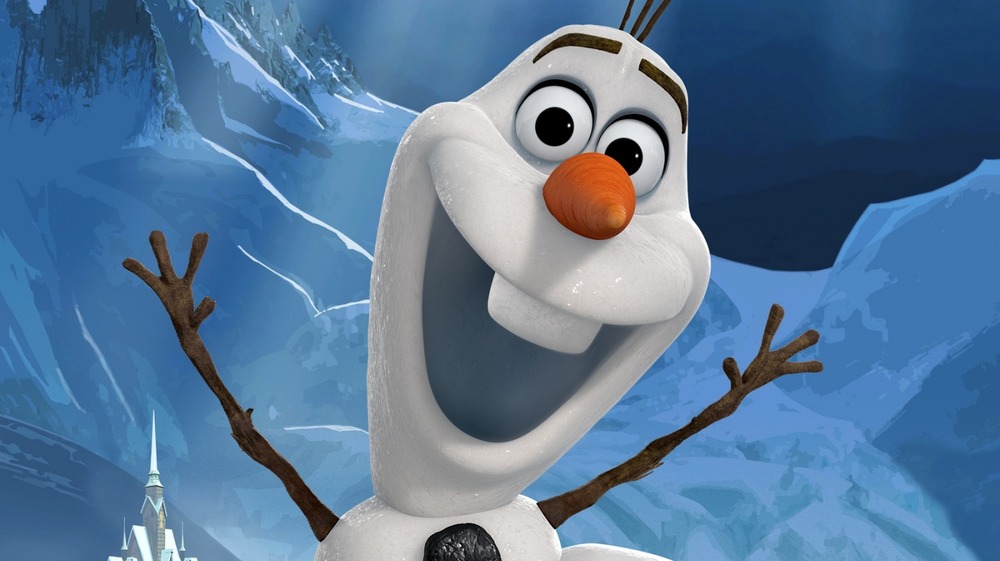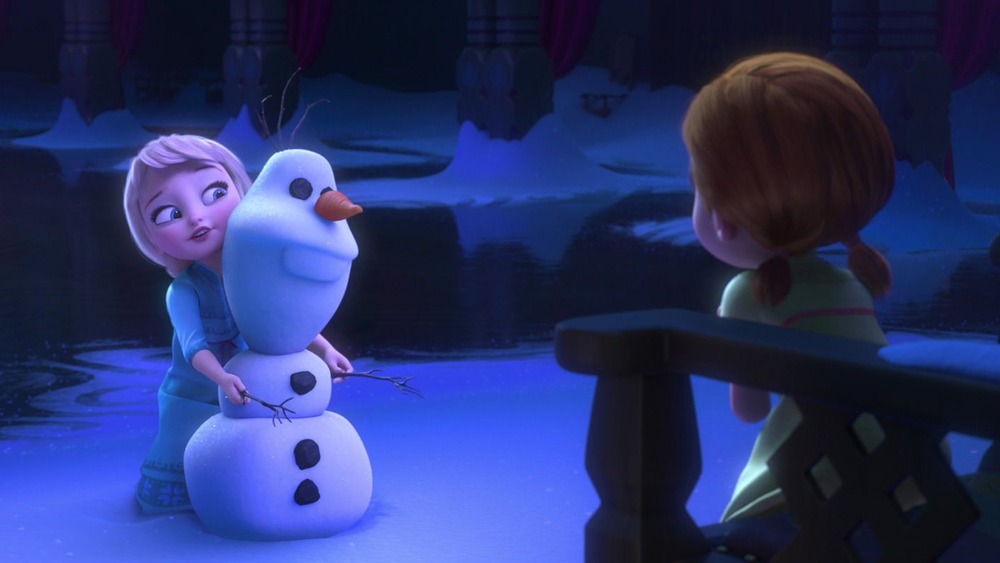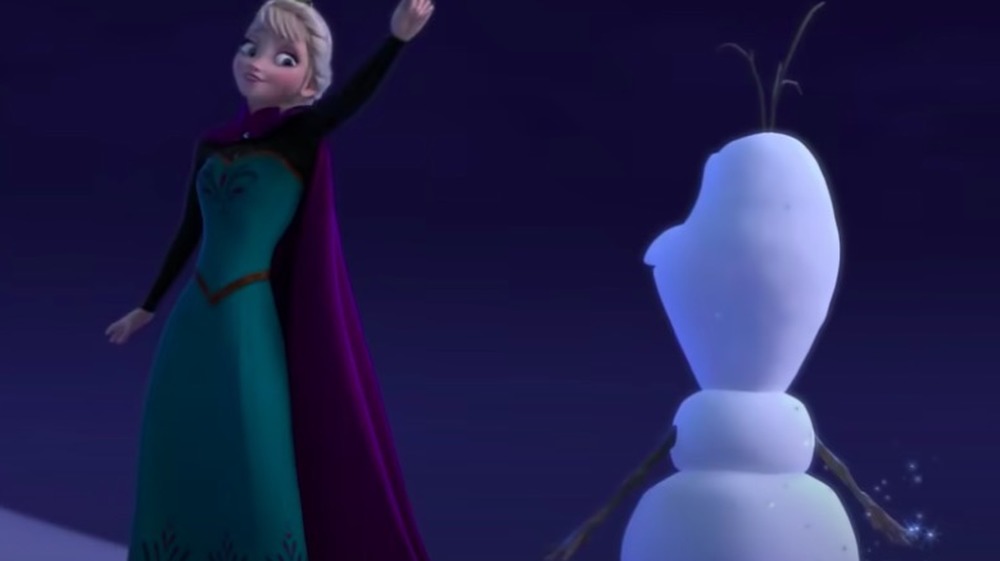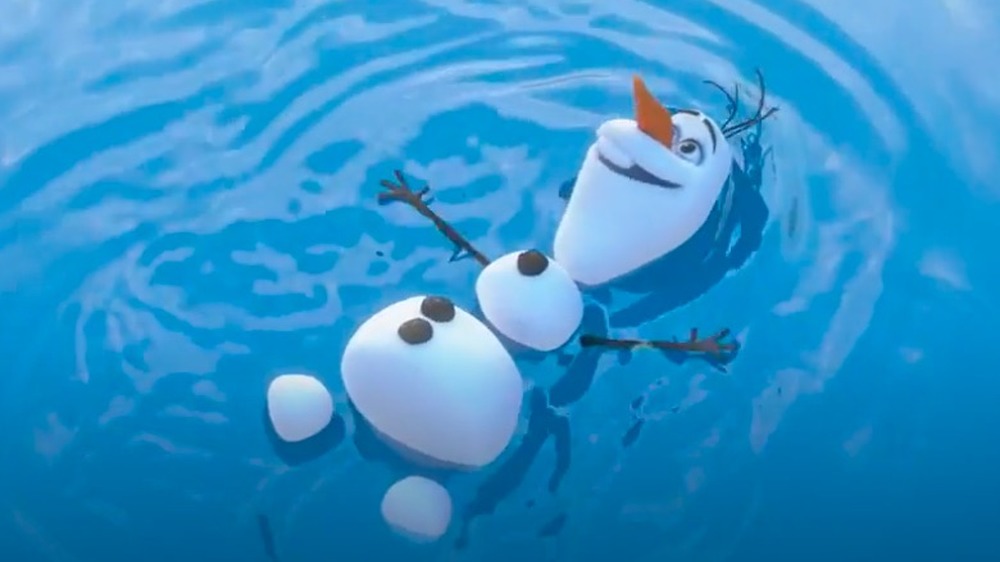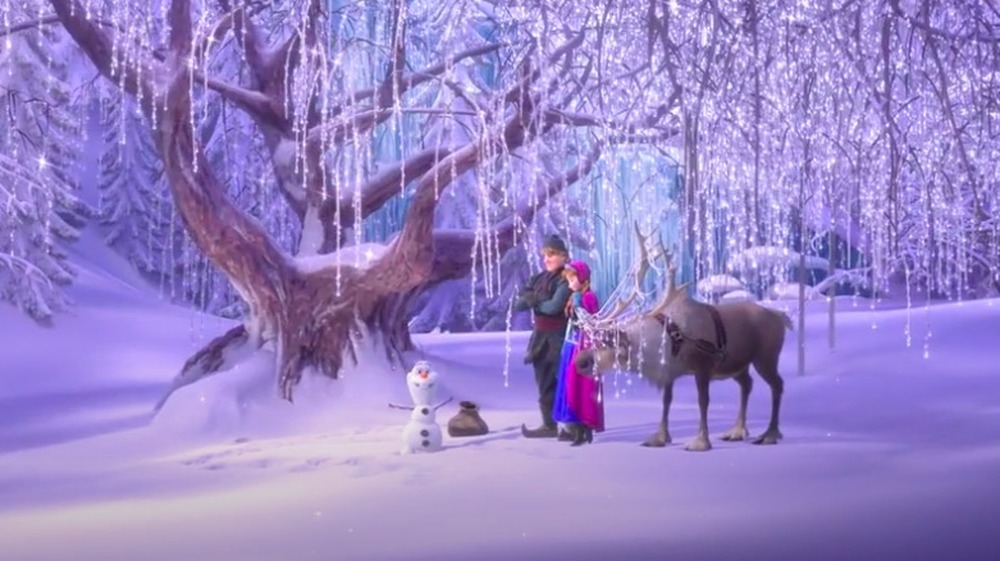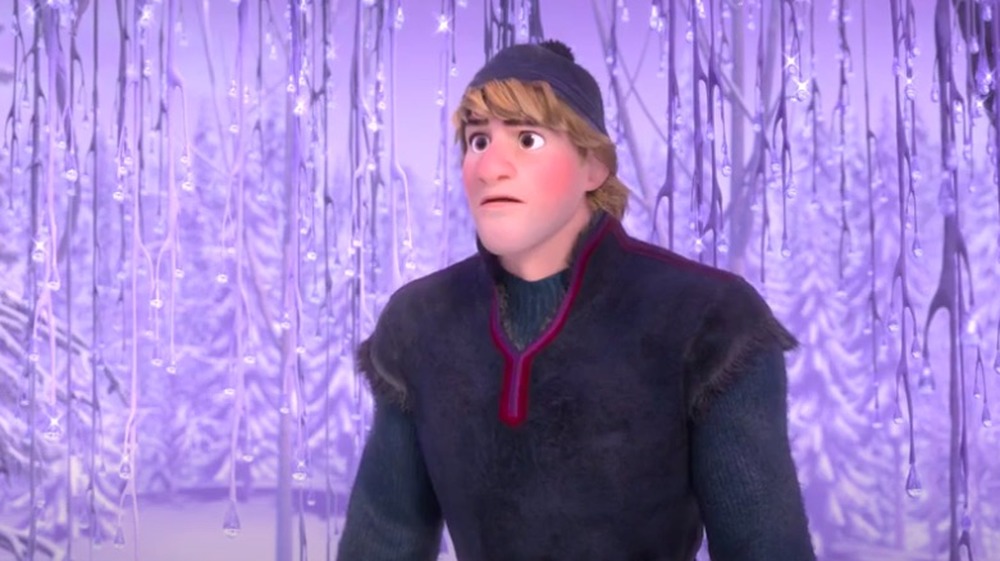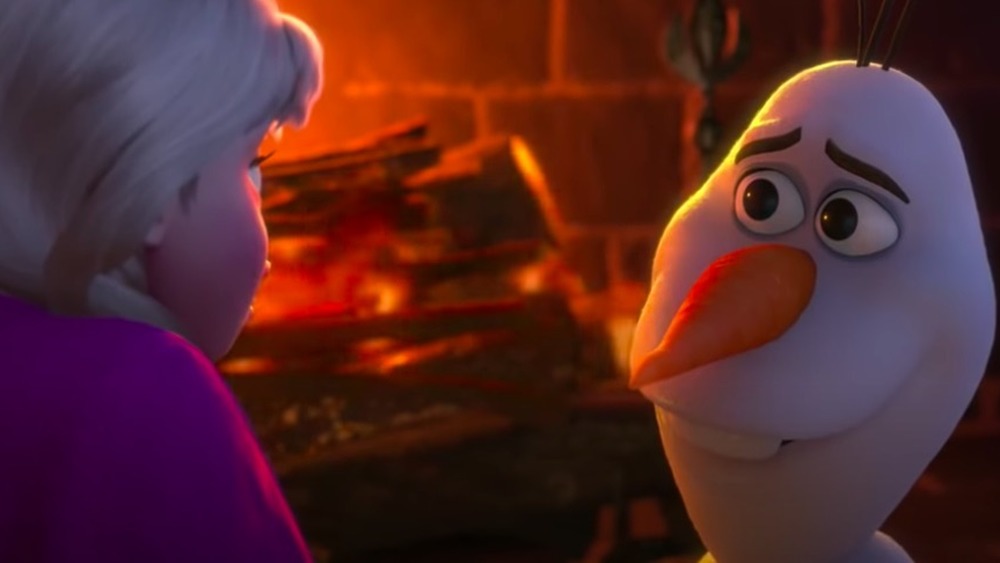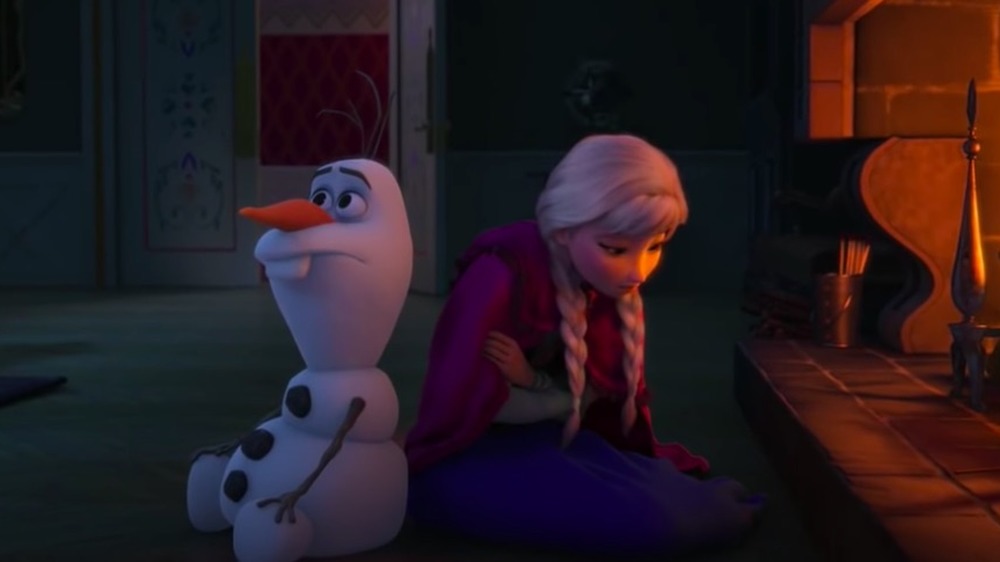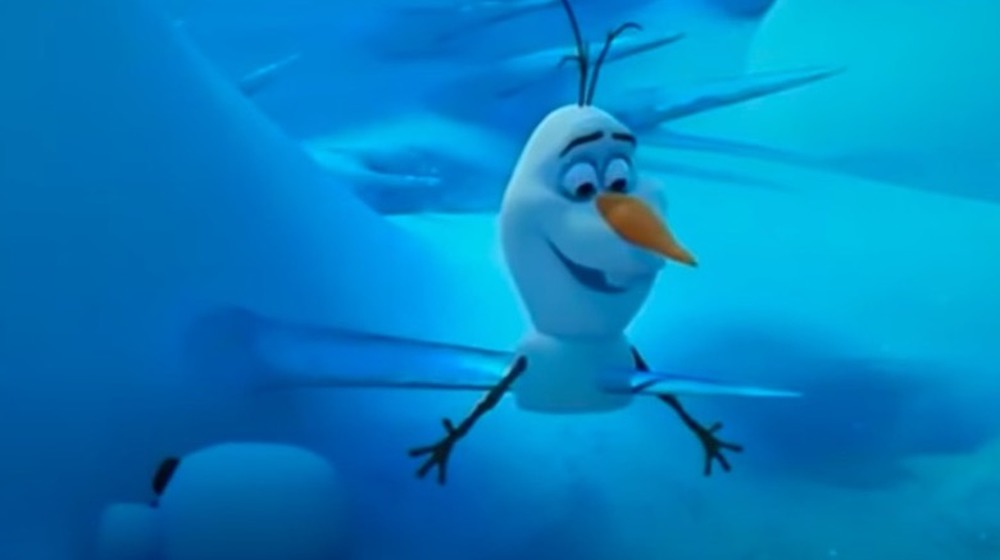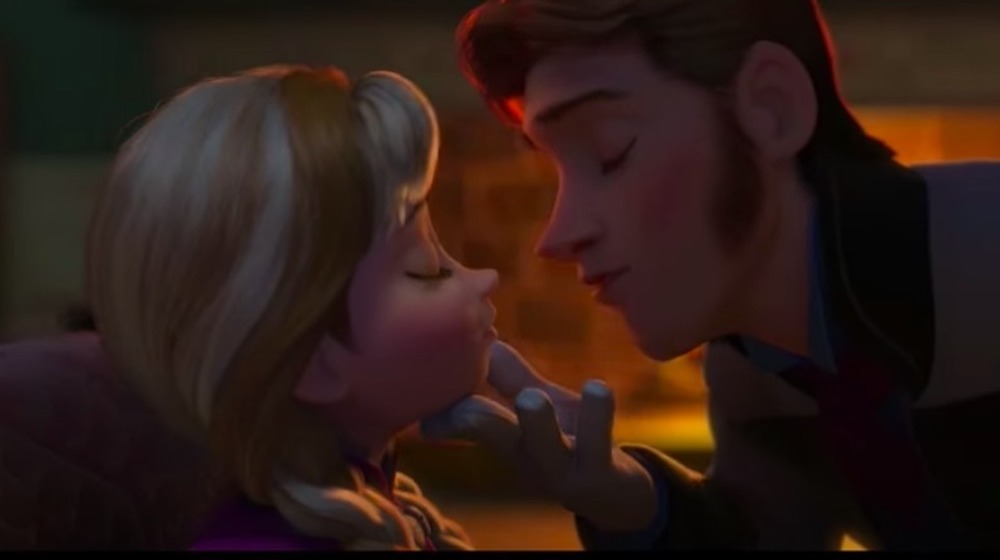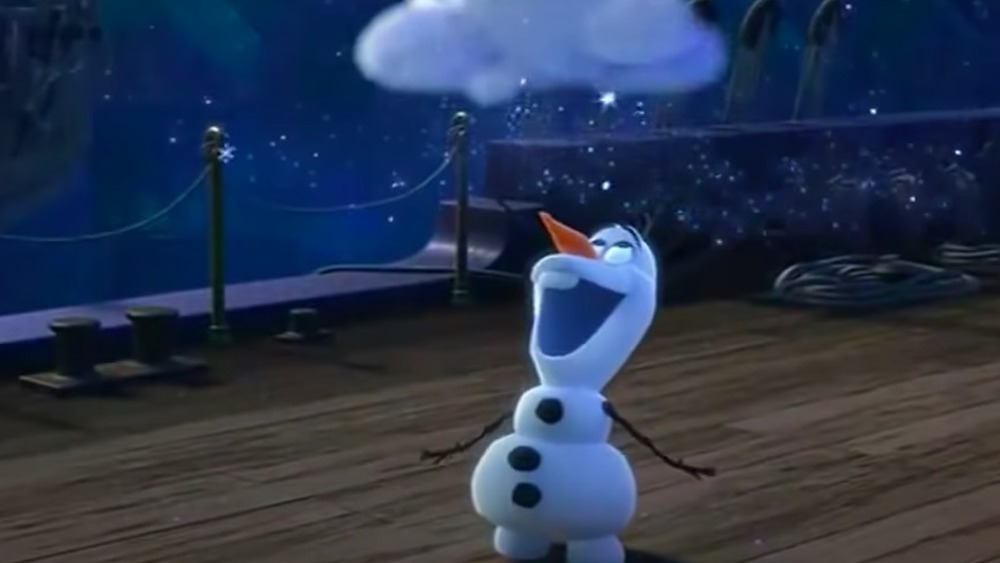Why Olaf Is The Best Part Of Frozen
Upon its release in 2013, Frozen quickly became one of Disney's most popular movies. It made over $1.280 billion worldwide at the box office, becoming the highest-grossing animated film at the time. It wasn't surpassed until its sequel came out in 2019: Only Frozen II could take the crown from its gargantuan predecessor.
Frozen follows sisters Elsa and Anna, princesses of Arendelle, as they confront the rift that's grown between them. After Elsa's icy powers trap the kingdom in an extreme winter, the newly-crowned queen escapes into the mountainous wilderness. Anna must go after her estranged sister, as the only person who might have a shot at reaching Elsa's closed-off heart. Along the way, Anna meets Kristoff and his reindeer, Sven, who she convinces to help her find Elsa. The three of them then meet Olaf, a goofy snowman Elsa gives life to. With his love of summer, earnest attitude, and seriously awesome singing voice, Olaf is easily many people's favorite part of the film.
There are countless things to love about Frozen: The sister relationship at the forefront, the strong supporting characters, the compelling plot. But Olaf often steals the show. We're here to explain why Olaf is the best part of Frozen, from his stalwart optimism to his surprisingly solid romantic advice.
Olaf represents Elsa and Anna's sisterly love
As children, Anna and Elsa enjoy a very close relationship. When Anna wakes Elsa in the middle of the night to play, Elsa is eager to do so. The two use Elsa's magical powers to turn one of the castle's rooms into a winter wonderland: They slide down snow hills, ice skate, and, of course, build a snowman. That snowman is Olaf, whom Elsa gives voice to, saying, "I'm Olaf, and I like warm hugs."
The scene quickly goes sour when Elsa accidentally strikes Anna with her powers. Upon first watch, Olaf is easy to miss in the midst of the rising action. However, this is not the last time we see Olaf — and when he appears again, he reminds viewers of what the sisters have lost. When Anna comes across Olaf, she and Elsa are distant, driven all the more firmly apart by Anna's surprise engagement and Elsa's destructive display of magic. But viewers know that Anna and Elsa built Olaf together during a happier period in their childhood. Their sisterly love was once very strong, and can, in time, regrow — Olaf's presence is there to prove it.
He's born during "Let It Go"
"Let It Go" is easily the most well-known song from the Frozen soundtrack. Over the course of Elsa's solo number, she realizes she no longer has to hide her powers, and rejoices in her newfound freedom. She builds a massive ice castle to live in by herself, away from the kingdom she has left behind.
The ice castle is certainly one of Elsa's most memorable creations, not only because of its grand size and scale, but because it represents Elsa's desire to finally use her powers as she pleases. After a lifetime of hiding, Elsa's desire to be by herself is an understandable one, even if it is hard to watch — especially once Anna finds her. However, the ice castle is not the only thing Elsa creates during this song: She also brings Olaf to life.
It's a subtle moment in the first chorus, a very blink-and-you'll-miss-it affair. But Olaf's shape is unmistakable, especially to a viewer who's seen the film before. He also confirms to Anna, upon their meeting, that Elsa created him. As "Let It Go's" lyrics imply Elsa and Anna are better off separated, Olaf being brought to life in the midst of it is a very pointed detail. He is representative of the love that exists between the two sisters, which endures despite Elsa's isolation — and appropriately, he ends up playing a key part in bringing them back together.
"In Summer" is one of the best numbers
Shortly after meeting, Anna tells Olaf that they are looking for Elsa so that she can bring summer back to Arendelle. Olaf gets excited, saying, "I don't why, but I've always loved the idea of summer and sun and all things hot." Kristoff looks at Olaf skeptically, assuming correctly that Olaf must not have any experience with heat. Olaf then breaks into "In Summer," an entire song about his dream of experiencing the season. He imagines tanning on the beach, enjoying a hot tub, and having picnics in the park. The idea of him melting never occurs to him, evidenced by his most hilarious line: "Winter's a good time to stay in and cuddle, but put me in summer and I'll be a — happy snowman!"
Olaf's blissful ignorance is not only comical, but sweetly endearing, and it makes viewers love him even more. When Kristoff smugly warns Anna he's going to spoil Olaf's dreams and tell him he'll melt, we're all with Anna when she exclaims, "Don't you dare!"
Olaf catalyzes the movie's climax
Olaf's presence is what makes Anna and Elsa's reunion at the ice castle possible. After meeting Olaf, the first thing Anna wants to know is if he knows where Elsa is. His answer is a remarkably blasé, "Yeah, why?"
After his big number, "In Summer," Olaf gets down to showing Anna and Kristoff the way to Elsa's isolated palace. Olaf is excited to meet Elsa, saying he thinks she must be "the nicest, gentlest, warmest person ever." Once there, when Elsa sees Olaf herself, Anna reminds her that they built him as kids, and that they used to have a close relationship. Elsa, for a moment, is comforted by these memories. But then she remembers the moment she struck Anna with her powers, and pulls back again. This leads to the climatic moment when Elsa strikes Anna with her powers once more — but this time, she hits her right in the heart. It's a thrilling, terrifying, majorly important moment in the movie — and it's all due to Olaf.
Olaf calling Kristoff "Sven" never gets old
When the gang meets Olaf, Anna is the first to introduce herself. Olaf then leans into Anna, asking who "the funky-looking donkey over there" is. Thinking he is confusing Sven, who is a reindeer, for a donkey, Anna tells him that it's Sven. But Olaf responds, "Uh huh, and who's the reindeer?" From then on, Olaf thinks that Kristoff and Sven both have the name "Sven," which, as he points out, "makes things easier" for him.
It's laughable when it occurs, but not necessarily something the viewer thinks will come back up. But, in a turn both clever and sensible (seeing as Olaf is never corrected), Olaf continues to refer to Kristoff as Sven. In one subtly hilarious moment, Olaf calls out to Kristoff, saying, "Hey, Sven!" in an effort to get his attention. The payoff is killer: Kristoff responds to the mistaken name without blinking an eye.
This joke continues on for quite some time, until finally, Kristoff takes them to meet his troll friends. One of them exclaims, "Kristoff's home!" Olaf repeats this, mirroring their enthusiasm, then leans into one of the trolls and asks, "Wait ... Kristoff?"
His love for Anna is the sweetest
When Anna is struck again by Elsa's powers, we find out from the trolls that only an act of true love can thaw Anna's frozen heart. Kristoff asserts that they must get Anna to Hans, for a true-love's-kiss solution. Olaf, with his usual enthusiasm, is on board right away, even before he knows who Hans is: "Let's go kiss Hans! Who is this Hans?"
After Anna finds out that Hans doesn't actually love her and only wanted to become king of Arendelle, she is left to die in icy agony. It is Olaf who finds her, and immediately rushes into action to warm her up so she doesn't freeze. He starts a fire in the fireplace, getting as close to fire as he's ever been in the process. Anna tells him to get away from it, as he starts melting. When Anna points this out, he replies with the most heart-warming — no pun intended — line of the film: "Some people are worth melting for."
Olaf's optimism is essential
Olaf consistently remains optimistic. Even when he, Anna, Kristoff, and Sven go up against the massive snow giant, Marshmallow, Olaf remains positive (and asserts to Marshmallow that while they were, indeed, talking about him, it was "all good things, all good things").
When Anna is close to freezing to death, things look bleak. She's just been rejected by Hans, and is unsure where to get her act of true love. When he finds out that Hans doesn't actually love her, Olaf barely reacts, despite this being the major plot twist of the film. Instead, he says, "I am not leaving here until we find some other act of true love to save you." Anna, who is also quite an optimist, has pretty much resigned herself to freezing to death at this point — she sees Hans as her last chance at escaping an icy demise. It is Olaf who insists there must be another way, that Anna can surely find true love elsewhere. Without his optimism in this moment, Anna's fate might have indeed turned out grimly. He inspires her to hold on.
He has killer one-liners
Olaf is undeniably the funniest part of Frozen. His mix of naivete in some moments and wisdom in others makes for many clever, sharp scenes of unexpected emotional depth. Olaf's role as comic relief is so successful that many of the movie's funniest one-liners belong to him.
One of these memorable lines occurs as our heroes are approaching Elsa's ice castle. Olaf, talking eagerly about meeting Elsa, doesn't notice as he walks straight into an icicle. The icicle goes right through Olaf's middle, as his bottom snowball continues walking on. When he notices this, he says, "Oh look at that, I've been impaled." He laughs lightly before the scene cuts away. It's a perfectly bizarre moment as unexpectedly grim as it is hilarious. He boasts plenty of other killer lines, which tend to balance solemnity and absurdity to funny effect. When Kristoff introduces his family, before they've revealed their true forms and appear to be boulders, Olaf begins loudly praising them. Quickly, in hushed tones, he turns to Anna and whispers, "Because I love you, Anna, I insist you run." We laugh — but we also respect his ride-or-die BFF attitude.
He somehow has a lot of wisdom about true love
About halfway through the film, Olaf makes an offhand comment: "I like to consider myself a love expert." It's a funny, passing line — how can Olaf know anything about love, let alone be an expert? But, it turns out to actually be true, as the viewer finds out later.
When Anna tells Olaf she was wrong about Hans, Olaf insists they find another act of true love to save her. When Anna says she doesn't even know what love is, Olaf responds, "That's okay, I do!" Considering that Olaf doesn't realize he would melt under the summer sun, viewers have reason to doubt this. Regardless, he delivers, and shows the viewer and Anna that he absolutely does know what love is. Olaf explains that love is being selfless and putting someone else before yourself. He then gives the example of Kristoff bringing Anna back to Hans, letting her go forever. He is, of course, implying that Kristoff loves Anna, and that it must have hurt him to bring her to another man, but did so to save her life. This may not be news to the viewer, but it is news to Anna. When she expresses surprise, Olaf says, "Wow, you really don't know anything about love, do you?" The viewer may have already suspected that Kristoff loves Anna, but hearing Olaf — with his surprising wisdom — be the one to say it out loud sure is fulfilling.
Olaf has one of the most satisfying endings
The act of true love that saves Anna ends up not being a kiss from Kristoff, although he does love her, but her own act of heroism, in service of her sister. This thaws Anna's heart, and she lives to deliver a killer punch right into Hans' smug jaw. Elsa returns to Arendelle to reign anew, restoring summer and her relationship with Anna. Anna and Kristoff get together in the end, just as many viewers — and Olaf — likely predicted. All is well, or on its way to getting there.
As for Olaf's ending? A viewer might get a little worried for his sake upon seeing Elsa bring back summer. Olaf, seeing a full summer bloom all around him and knowing that Anna is alive, says, "Hands down, this is the best day of my life — and quite possibly the last!" He begins melting furiously, but Elsa saves him by creating a personal snow cloud to endlessly float over his head and keep him frozen. We may have laughed at his ignorance during "In Summer," but Olaf does, in the end, get to experience summer along with everyone else. We can only imagine that he does everything he dreamed of, including lying on the sand and having picnics in the sun.
